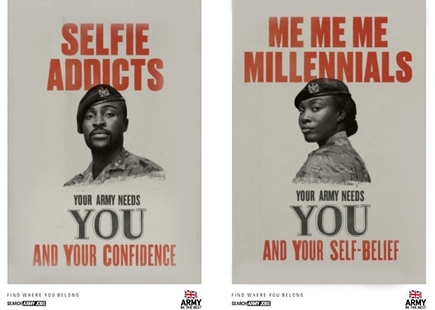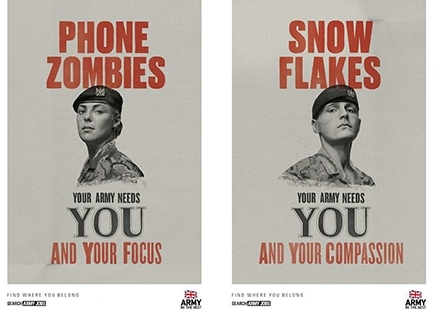The British Army’s attempt to recruit ‘snowflakes’ misfires

The latest chapter in the British Army’s attempt to stymie it’s recruitment crisis.
It is calling on ‘selfie addicts, me me me millennials and snowflakes’ to fill its ranks.
The Big Idea
It riffed on the already much-riffed on Kitchener-style WW1 illustration to target 16 to 25 year olds (popularly called Gen Z) by finding positives in its much maligned public perception.
It hopes to convince young people that, unbeknownst to them, they might have all the skills they need to make it in the Army.
What They Did
Launched an impactful range of posters that call out the target audience and supported this with three television adverts that take a Gen Z character trait and turn it into a positive (in the eyes of the Army).


The Review
The Army’s recruitment just changed tack.
Rather than calling out for the expected traits of soldiers (such as strength, grit and courage) it is hoping to teach young people that some of their traits are unexpectedly a perfect fit for the Army – despite what other employers say about them. The campaign states that the Army could utilise the ‘self-belief’ of millennials and the ‘compassion’ of ‘snowflakes’.
Millennials (and perhaps to a slightly lesser extent Gen Z) are more than aware of the unfavourable light they are often painted in; entitled, precious, self-obsessed. The Army has sought to find the positives in youth culture and use those positives as the foundation for its recruitment campaign.
On the surface, this is a great idea.
The posters have caught everyone’s attention and initially it feels like the Army gets ‘us’ (yes, I’m a millennial… just! Having said that, this campaign is really aimed at Gen Z so I’ll stop with the collective tense).
It’s a private joke between the Army and young people; enabling them both to stick up their proverbial middle fingers to the ‘old people’ obsessed with pigeonholing them.
I really wanted to believe that it would be 'relatable'… but then I watched the adverts. I hoped to see something nuanced and clever and subtle. Something unexpected, in a good way. Granted, I’m not the right target audience, but the adverts left me baffled.
One sees a young female supermarket assistant collecting and stacking trolleys with precision despite getting slagged off by older colleagues for how long it takes. Are we really supposed to believe this happens in our supermarkets? It’s just a bit cringe worthy.
The next one sees the Army make the bold assertion that the kind of stamina it takes to complete a tough computer game is pretty much the same as the perseverance it takes to trek through war-torn villages on red-alert.
I’m clearly no military expert, but surely there are a multitude of Army roles that better suit the technological nous, screen exposure and fast-twitch, problem-solving muscles of a gamer more than a foot soldier? If the Army is running this campaign because the skills in a modern military operation have changed then why isn’t this demonstrated in the adverts? It just looks like typical soldiering to me.
The Army has tried to flip a societal perception in order to resonate with young people.
Sadly, l think that the ads expose the Army more for what it doesn’t understand about young people than what it does.
To work, this campaign surely has to leave young people feeling that the Army gets them? I’m not sure it does.
In Hindsight
I like that this campaign was done.
I respect that it is tapping into a culture of disillusioned and disenfranchised young people and I’m sure that the Army would be a great fit for many of them.
But I don’t like the execution.
Does it get a different perception of the Army out there? Yes.
And we all know controversy is a great talking point (perhaps the Army expected a few ‘snowflakes’ to be offended).
But I suspect the way Gen Z haven’t warmed to the campaign means the Army – in exploring new territory – has misfired a bit here.
I fear it thought it was being really clever. Really funny. In reality the campaign is glib and was outdated before it was launched.
Having said that (spot the backtrack), it only needs to ignite the interest of few to turn around their recruitment problem. Therefore, the attention-grabbing nature of this campaign alone might just be enough to do the job. A lot of young people don’t know where to turn for career fulfilment and they won’t be put off by my narrow creative critique. They won’t even read it!
If you enjoyed this article, you can subscribe for free to our weekly email alert and receive a regular curation of the best creative campaigns by creatives themselves.
Published on:


